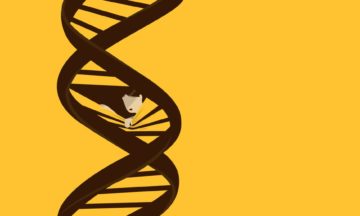Daniel Davis in The Guardian:
 While at the till in a clothes shop, Ruby received a call. She recognised the woman’s voice as the genetic counsellor she had recently seen, and asked if she could try again in five minutes. Ruby paid for her clothes, went to her car, and waited alone. Something about the counsellor’s voice gave away what was coming. The woman called back and said Ruby’s genetic test results had come in. She did indeed carry the mutation they had been looking for. Ruby had inherited a faulty gene from her father, the one that had caused his death aged 36 from a connective tissue disorder that affected his heart. It didn’t seem the right situation in which to receive such news but, then again, how else could it happen? The phone call lasted just a few minutes. The counsellor asked if Ruby had any questions, but she couldn’t think of anything. She rang off, called her husband and cried. The main thing she was upset about was the thought of her children being at risk.
While at the till in a clothes shop, Ruby received a call. She recognised the woman’s voice as the genetic counsellor she had recently seen, and asked if she could try again in five minutes. Ruby paid for her clothes, went to her car, and waited alone. Something about the counsellor’s voice gave away what was coming. The woman called back and said Ruby’s genetic test results had come in. She did indeed carry the mutation they had been looking for. Ruby had inherited a faulty gene from her father, the one that had caused his death aged 36 from a connective tissue disorder that affected his heart. It didn’t seem the right situation in which to receive such news but, then again, how else could it happen? The phone call lasted just a few minutes. The counsellor asked if Ruby had any questions, but she couldn’t think of anything. She rang off, called her husband and cried. The main thing she was upset about was the thought of her children being at risk.
Over the next few weeks, she Googled, read journal articles, and tried to become an expert patient in what was quite a rare genetic disorder. There wasn’t much to go on, and, not being a scientist herself, it was hard for her to evaluate what she did find. She learned that a link between mutations in this particular gene and connective tissue problems had only recently been discovered. A few years earlier this disease did not exist, or at least it had yet to be named. Over time, some details emerged. Nobody had ever seen her own family’s particular mutation in anyone else. So that meant it was very hard to know what to make of her situation. Her risk of a heart problem was surely increased, but nobody could say by how much.
More here.
